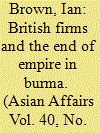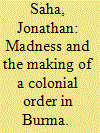|
|
|
Sort Order |
|
|
|
Items / Page
|
|
|
|
|
|
|
| Srl | Item |
| 1 |
ID:
086559


|
|
|
|
|
| Publication |
2009.
|
| Summary/Abstract |
A detailed examination of the war-time discussions within the British government and between government and the private sector over the direction of Burma's post-war economic reconstruction and the conditions under which companies might return. Through the focus on capital and commerce, the author seeks to explore British understandings-and misunderstandings- in their broadest sense.
|
|
|
|
|
|
|
|
|
|
|
|
|
|
|
|
| 2 |
ID:
139606


|
|
|
|
|
| Summary/Abstract |
Bringing to light the first known Urdu primary source on Islam in colonial Burma, this essay examines the polemical encounter with Buddhism in the years surrounding the Third Anglo–Burmese War. Using the model of religious economy, the Urdu Sayr-e Barhma is contextualised amid the religious pluralisation and competition that accompanied colonisation as a multitude of religious ‘entrepreneurs’ and ‘firms’ rapidly entered the colony. Among them was the Indian Muslim author of Sayr-e Barhma, which provided a detailed account of the history, language and theology of Burman Buddhists and included an account of a public debate which, it claimed, culminated in the conversion of the Thathanabaing (Primate). Against the long-standing historiographical emphasis on the economic roots of anti-Indian sentiments in colonial Burma, this essay points to the religious dimensions of these enduring antagonisms.
|
|
|
|
|
|
|
|
|
|
|
|
|
|
|
|
| 3 |
ID:
126653


|
|
|
|
|
| Publication |
2013.
|
| Summary/Abstract |
As Professor Ian Brown's recent work on the colonial prison in British Burma has shown, the proportion of the population convicted of crimes was routinely and markedly higher than in any other province of British India. Part of the explanation for the exceptionally high figures may be the colonial criminalization of practices that were previously lawful. Gambling was one such activity that the British, at least according to their rhetoric, were intent on prohibiting as part of their 'civilizing mission'. However, in practice colonial law was more ambiguous and equivocal. Government prosecutors and judges disputed the definition of gambling and struggled to differentiate it from other tolerated practices. Beyond these legal difficulties, individual British officials often found it necessary to turn a blind eye to gambling. On an everyday level, subordinate officials in the police and magistracy had an ambivalent relationship with gambling. Although empowered to suppress it, some chose to ignore its presence and others still were actively conniving with it. By studying how the British sought to control gambling in the colony at the turn of the twentieth century, this article seeks to restore the full complexity to the history of criminality in colonial Burma.
|
|
|
|
|
|
|
|
|
|
|
|
|
|
|
|
| 4 |
ID:
118921


|
|
|
|
|
| Publication |
2013.
|
| Summary/Abstract |
In general, during the nineteenth century the British were indifferent to the condition of the insane in colonial Burma. This was most apparent in the Rangoon lunatic asylum, which was a neglected institution reformed reluctantly and episodically following internal crises of discipline and the occasional public scandal. However, whilst psychiatry was generally neglected, British officials did intervene when and where insanity threatened the colonial order. This occurred in the criminal courts where the presence of suspected lunatics was disruptive to the administration of justice. Insanity was also a problem for the colonial regime within the European community, where erratic behaviour was viewed as a threat to racial prestige. This paper shows how, despite its neglected status in Burma, psychiatric knowledge contributed to British understandings of Burman masculinity and to the maintenance of colonial norms of European behaviour.
|
|
|
|
|
|
|
|
|
|
|
|
|
|
|
|
| 5 |
ID:
188739


|
|
|
|
|
| Summary/Abstract |
Two years after the Anglo-Burmese War, with the British colonial takeover of Burma complete and yet still subject to outbreaks of rebellions, a small group of Karen Baptist intellectuals in Rangoon who formed the Karen National Association (KNA), attempted to assert a political claim to Karen nationhood. This article focuses on two letters, in English and Sgaw Karen, presented by Karen delegates on the occasion of the ceremony to celebrate the Golden Jubilee of Queen Victoria in 1887 in Rangoon, to investigate the colonial politics of loyalty and national claim. It argues that the letters were written for two different audiences, and by doing so the Karen Baptists were asserting dual claims; one directed at the British colonial authorities and the other, the wider population of Karen in Burma, with their multiple Karennic languages and religious and other affiliations. Both appeals failed to get the desired responses, however. This article then discusses the contradiction that this assertion of Karen nationhood alienated the Baptist leaders from their own diverse community.
|
|
|
|
|
|
|
|
|
|
|
|
|
|
|
|
|
|
|
|
|